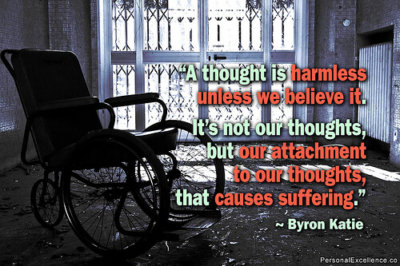Negative Thinking – Is It Sabotaging Your Life?

By: Holly Lay
When younger, we can easily assume our thoughts are all that we are. But as adults most of us realise that thoughts are not only far from all that we are, they are often far from the truth.
And without conscious effort to notice and control our thoughts, many of us have a habit of negative thinking. Does this matter? Definitely.
Negative thinking leads to negative emotions and negative choices in life (for more on how this cycle works, read our Guide to Thinking Errors).
Signs that negative thinking is running your life
There is a good chance negative thinking is something you are struggling with if:
- you have difficulty accomplishing things and reaching your goals
- you often stop yourself from doing the things you want to do
- life seems a constant struggle
- you think the world is a dangerous place
- you are convinced that everyone else is happier than you are
- you end up thinking badly of most people you get involved with
- you have been told by others you are a pessimist
- you have issues with most of your coworkers and/or family members
- you sabotage your success
- you constantly feel stressed and anxious
What does negative thinking sound like?
Most negative thinking is what psychology and in particular cognitive therapists calls ‘cognitive distortions’ – thoughts that happen when our mind wants to convince of us something without having any real facts on the matter.
Listen for distortions like these:

By: Joel Ormsby
Black and white thinking – “I didn’t get first place so I’m a total loser”.
Over-generalisation – “I never do anything right”
Labelling – “I’m a failure”
Catastrophising – “Because I did bad on that one essay I’m definitely going to fail the course” .
Minimising – “Anyone could have done this project well, it’s no big deal”.
Discounting the positive – “She gave me a compliment but she was just being nice”.
(For more distortions, read our article on Common Cognitive Distortions. )
Why do I have such negative thinking?
It’s possible that some patterns of thinking might be genetic, and that we are born with more of a tendency to see a glass either half full or half empty.
But in general negative thinking is the result of our childhood experience and childhood trauma.
Negative thinking is often a learned habit. If our parents and caregivers focused on the negative in both the world, other people, and/or themselves, as children we mimic this and it becomes a way of living and seeing the world that we don’t question.
Negative thinking can also be the result of difficult experiences. If you experience a life trauma as a child, such as sexual abuse or not receiving proper attachment, it leaves you to believe the world is a place you aren’t safe in. From this strong core belief of ‘the world is a dangerous place’ come many other negative thoughts, like ‘I can’t trust anyone’ and ‘bad things will always happen to me’.
Being constantly criticised or shamed as a child also leads to negative thinking as an adult. Children and adolescents internalise such negativity and it becomes their inner soundtrack.
How can I stop negative thinking?
1. Try mindfulness.
The problem with negative thinking is that it can happen so fast, and be such an ingrained habit, that we are not even consciously aware of how big the problem is. This is where mindfulness helps. It’s about learning to pay attention to how you think and feel in each moment, and with practise you will find you can catch your thoughts and choose to change them.
2. Work on your self-esteem.
Most negative thinking is linked to self-esteem. We criticise ourselves because we have low self-esteem, then have negative thoughts or doubts about others because we project our negativity about ourselves onto them rather than face it.
Learning to recognise and focus on your strengths has the opposite affect, leading to more balanced thoughts about yourself that make it easier to have kinder thoughts about others and the world.
3. Practise self-compassion.
The art of being nice to yourself, known as self-compassion, can be one of the fastest ways to self-esteem as it involves accepting yourself as is. And the more you accept your own humanity, the more likely you are to accept it in others. Combining self-compassion with mindfulness can be very useful, meaning that when you catch your negative thoughts you can then replace them with ones that are kinder to yourself until eventually the kinder thoughts come naturally.
4. Try journalling.
Getting your negative thoughts out of your head and onto paper via journalling can be its own sort of therapy. Once your thoughts are on paper in front of you it can be easier to see where they come from and just how unrealistic and unhelpful they might be. If it makes you feel nervous to put your negative thoughts to paper, then commit to ripping the paper up afterwards so nobody will ever see it and you can feel safe to let things flow.
5. Try working with a cognitive behavioural therapist.
Cognitive behavioural therapy (CBT) has the mission of helping you to recognise the link between your thought patterns and your actions and moods. Over the course of your sessions you will learn to pay attention to your thoughts, question them, choose more balanced ways of seeing things, and thus alleviate low moods and begin to make better life choices.
Do you have a great tip for managing negative thinking? Share below.






You can find remedy from any difficulty by counselling. If you believe and follow the advice of a counselor .
Well not quite… a good counsellor or therapist does not give ‘advice’!! There are there to help you understand yourself and find your own answers. They give instead empathy and understanding.